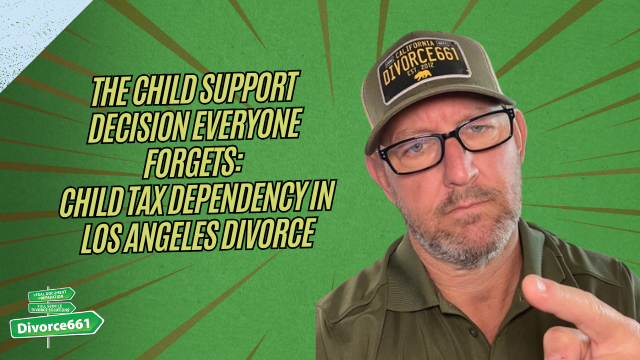👦 The Child Support Decision Everyone Forgets: Child Tax Dependency in Los Angeles Divorce
When navigating the complexities of divorce, especially when children are involved, there are many important details to consider beyond just custody and child support payments. One crucial aspect that often gets overlooked is the decision regarding who claims the children as tax dependents. This detail can have significant financial implications for both parents and deserves careful attention during divorce proceedings.
Tim Blankenship of Divorce661, a trusted voice in Los Angeles divorce matters, highlights this frequently forgotten decision that can impact families long after the divorce is finalized. Here’s what you need to know to avoid missing this important piece of the puzzle.
The Overlooked Child Tax Dependency Decision
Most people understand that child support is a key part of divorce agreements involving minor children. However, many don’t realize that while child support addresses the financial needs of the child’s day-to-day life, the tax benefit of claiming children as dependents on income tax returns is a separate and equally important issue.
Tim Blankenship points out that when parents handle their divorce on their own, they often forget to specify who will claim the children as tax dependents. This oversight can lead to confusion and disputes with the IRS down the line, as only one parent can claim the child for tax purposes each year.
Why Does Child Tax Dependency Matter?
- Tax Benefits: The parent who claims the child as a dependent can qualify for various tax credits, such as the Child Tax Credit and Earned Income Tax Credit, which can provide substantial financial relief.
- Financial Planning: Knowing who claims the child helps both parents plan their finances more accurately during and after the divorce.
- IRS Compliance: Properly documenting who claims the child prevents issues with the IRS and avoids potential penalties or audits.
How to Address Child Tax Dependency in Divorce Agreements
To prevent confusion and ensure both parents understand their rights and responsibilities, the divorce agreement should explicitly state who will claim the children as tax dependents each year. Here are some common approaches:
- Alternate Years: Parents agree to alternate claiming the child as a dependent every other year.
- One Parent Always: One parent consistently claims the child, often the custodial parent, while the other receives adjusted child support to compensate.
- Specific Conditions: The agreement might specify conditions under which the tax dependency can switch, such as changes in custody or financial circumstances.
It’s also important to include language that prevents both parents from claiming the child in the same tax year, which could lead to IRS disputes.
Final Thoughts
When you’re managing your own divorce, it’s easy to focus on the immediate concerns like custody and child support, but don’t forget the critical tax dependency decision. As Tim Blankenship emphasizes, making sure you clearly designate who claims the children as dependents will save you from headaches and financial complications later on.
Taking the time to address this detail in your divorce agreement ensures clarity, fairness, and compliance with tax laws — all of which contribute to a smoother transition for both parents and children.
For more insights into navigating divorce in Los Angeles and handling complex issues like child support and tax dependency, consider consulting experienced professionals or trusted resources that can guide you through the process.

